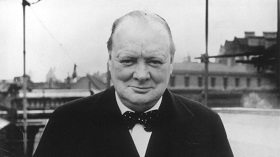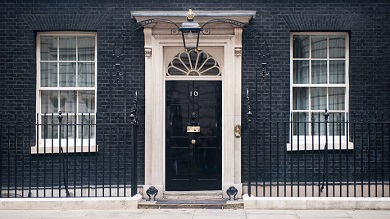The art of being oneself?
Regular readers may have noticed that our current affairs department, of which I am a notional member, has effectively declared an unofficial moratorium upon matters political and Brexit these past few months, having assumed that most Rusters – like ourselves – had become heartily sick if not terminally bored with an ongoing saga that could have been filed in the office cabinet folder marked “You Couldn’t Make It Up” at least 24 months ago.
 My throwaway thought as overnight I came to the computer to compose this post was that – the longer it goes on – the more absurd it seems to become.
My throwaway thought as overnight I came to the computer to compose this post was that – the longer it goes on – the more absurd it seems to become.
Nevertheless, as I watched the bizarre events of the past fortnight unfold from the sanctuary of my living room, right up to the news I have just learned from the BBC that Michael Gove has become the latest – and eighth – Tory MP to throw his hat into the ring, something metaphorically slapped me in the face (once again).
I cannot claim a higher intelligence or insight/perception quotient than the average man on the proverbial Clapham omnibus.
In one sense I don’t need to, because my point today is essentially facile, obvious and probably also instinctive regarding both those who appear in the public eye and/or at the centre of great events and also those who – whilst they do not – nevertheless look on and whose lives may be potentially affected by what subsequently transpires.
 My reflection today is upon the profound effect of such as the looks, charisma, style, character, personality, sense of humour – okay, the sheer humanity – of other people.
My reflection today is upon the profound effect of such as the looks, charisma, style, character, personality, sense of humour – okay, the sheer humanity – of other people.
I suppose one could sum it all up, especially in any prospective political, leadership or team context, as the credibility of “the image” of the person one is meeting, watching or listening to – which may then lead to one ‘buying into’ the logic and thrust of what they are saying.
Let me get down to it with some basics.
As human beings we respond to others we come across. We are attracted to those whom impress us, or we like, or perhaps whom we sense are kindred spirits.
By the same token, we are indifferent (or sometimes worse) to those who do not impress us, or whom we sense would add little to our existence … or even perhaps, should events conspire that we never saw them again, it would be an eventuality that cost us nothing.
 If they have the choice, people like spending time – and indeed doing business when that arises – with those whose company they enjoy, or think they would.
If they have the choice, people like spending time – and indeed doing business when that arises – with those whose company they enjoy, or think they would.
Why else would it be that people in the professions who are affable and open as often as not end up being as – or more – successful than those who are brilliant but also ‘difficult’, opinionated or socially awkward?
Part of the answer must surely be that – whilst on the rare occasions when the chips are really down you might always strive to hire the very best – generally, you’d rather employ someone on your team who’s at least better than competent and can get things done but whose company you also enjoy?
 I could go to a different level.
I could go to a different level.
We all begin from the standpoint that we try to treat people the way that we would like to be treated by others.
We gravitate towards those who reciprocate in this respect and we tend to avoid those who don’t. It’s a natural thing.
And so to politics – and yes, I apologise to those whom today would prefer not to go there.
For me, when it happened, it was as plain as a pikestaff that the Tory party electing (or was it just ‘anointing’?) Theresa May as its leader and therefore Prime Minister was a disaster in waiting.
 From the outset of her lengthy political life she has come across as committed, hard-working and diligent – but also unclubable, socially awkward, dull, dogged and hardly the sort of person that one would choose to go down to the pub with for a drink.
From the outset of her lengthy political life she has come across as committed, hard-working and diligent – but also unclubable, socially awkward, dull, dogged and hardly the sort of person that one would choose to go down to the pub with for a drink.
Now this particular chicken has come home to roost, as arguably it was always going to. She has performed as Prime Minister exactly as she has done from the beginning as a politician.
What else did anyone expect?
 The legendary sports journalist Hugh McIlvanney once famous wrote these final word in his report for The Observer after the ill-fated Welsh bantamweight boxer Johnny Owen died in a world title fight on 21st October 1980:
The legendary sports journalist Hugh McIlvanney once famous wrote these final word in his report for The Observer after the ill-fated Welsh bantamweight boxer Johnny Owen died in a world title fight on 21st October 1980:
“Outside the ring he was an inaudible and almost invisible personality. Inside, he became astonishingly positive and self-assured. He seemed to be at home there more than anywhere else. It is his tragedy that he found himself articulate in such a dangerous language”.
She is devoted to politics – it is her life – and, of course, when that is the case, she aspired to win the ultimate prize (ultimate justification if you like) of ascending to the office of Prime Minister.
Her problem was that she was never suited to the job – could never have been, as was evident from the beginning [see above] and as she’d proved time and again throughout her career – and sadly, as we have all just witnessed in car-crash slow motion glorious high-definition technicolour fashion, the inevitable has happened.
But it doesn’t end there, does it?
Let’s look at the Tories’ leadership race contenders to replace Mrs May as Premier:
 Supposed front runner Boris Johnson is a classic stereotypical case in point.
Supposed front runner Boris Johnson is a classic stereotypical case in point.
Being charitable, he’s undoubtedly clever, charismatic and someone who passes the “pub drink” test – but at the same time also unprincipled, chaotic, gaff-prone and (on the evidence of his performances in great offices of state) lazy, woefully under-prepared and, in short, a clown.
At least that’s how other public figures and the media portray him and frankly (here writing as a punter) I’m convinced they’re probably correct.
I cannot imagine him as a statesman or exceptional man-manager, or even as an astute delegator of responsibility, simply because his personal sense of responsibility comes across as barely troubling the needle on the gauge.
Dominic Raab, Rory Stewart, Esther McVey and Matt Hancock are all lightweights.
 Jeremy Hunt looks and sounds like a lightweight – “a rabbit in headlights” is my go-to description whenever I see him interviewed on television.
Jeremy Hunt looks and sounds like a lightweight – “a rabbit in headlights” is my go-to description whenever I see him interviewed on television.
Damningly, he seems to have performed but averagely in every department he’s ever headed since 2010, and there have been not a few of those.
Andrea Leadsom seriously blotted her copybook – a stain that will remain on her profile for many years yet – by saying or implying during the last leadership contest that she’d be a better Prime Minister than Mrs May because – unlike Mrs May – she’d had children … and as a result of the outraged response, then pulling out to leave Mrs May’s ascent to the throne unchallenged.
Lastly, of course, there’s Michael Gove.
Sadly for him, he most resembles a nerdy school swot: who in their right mind could possibly want to see him treading the boards of a world summit stage representing the UK?
Furthermore, whilst I understand he’s been a minor force for good as a departmental minister, he’s another still most well-known for a famous cock-up, his treacherous plunging of a knife into the back of Boris Johnson for whom he was supposedly acting as official cheerleader in the last leadership contest.
Not exactly a line-up that would inspire confidence across the nation, is it?
But let’s go back in history.
 Tony Blair – a snake-oil salesman best self-characterised by his pained response to the avalanche of criticism that attended his acceptance of a £1 million donation to Labour from Bernie Ecclestone after which Formula One received an exemption from a tobacco sponsorship ban (“I think most people who have met me think I am a pretty straight sort of a guy, and I am …”).
Tony Blair – a snake-oil salesman best self-characterised by his pained response to the avalanche of criticism that attended his acceptance of a £1 million donation to Labour from Bernie Ecclestone after which Formula One received an exemption from a tobacco sponsorship ban (“I think most people who have met me think I am a pretty straight sort of a guy, and I am …”).
 Or Gordon Brown and sometime Deputy Premier Nick Clegg?
Or Gordon Brown and sometime Deputy Premier Nick Clegg?
Enough said.
And then there’s the other side of the coin.
 John F. Kennedy may have been a ‘difficult dog to keep on the porch’, as another serial womanising US President Bill Clinton was once characterised, but his persona and image was that of a charismatic A-Lister intellect and supremely-competent all-round good sort, the kind of leader than any discerning electorate would be happy to follow anywhere.
John F. Kennedy may have been a ‘difficult dog to keep on the porch’, as another serial womanising US President Bill Clinton was once characterised, but his persona and image was that of a charismatic A-Lister intellect and supremely-competent all-round good sort, the kind of leader than any discerning electorate would be happy to follow anywhere.
 And for another example, step forward please Winston Churchill, of whose latest biography by Andrew Roberts I am at last nearing the end.
And for another example, step forward please Winston Churchill, of whose latest biography by Andrew Roberts I am at last nearing the end.
For all his faults and failings – and there were many – he looked and sounded like exactly the sort of leader who could be relied upon by any nation in its greatest hour of need.
Because he was.


